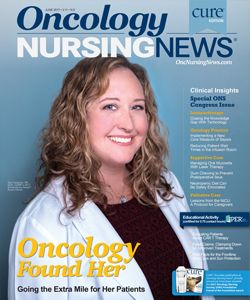Emerging BTK Inhibitor Tested in B-Cell Malignancies
Emerging BTK Inhibitor Tested in B-Cell Malignancies

BGB-3111, a second-generation Bruton tyrosine kinase (BTK) inhibitor, is being tested in patients with refractory B-cell lymphoid malignancies in an effort to determine whether the novel oral small molecule is a viable therapeutic option and to better understand its pharmacologic properties. Investigators also are seek- ing to differentiate BGB-3111 from ibrutinib (Imbruvica), the first and thus far only FDA-approved BTK inhibitor.
RATIONALE
BGB-3111 is a potent, irreversible, and highly selective BTK inhibitor that blocks the signaling that leads to growth inhibition and cell death in malignant B cells. “The mechanism is the same as ibrutinib, but with less off-target kinase activity,” explained the study’s principal investigator Constantine S. Tam, MBBS, MD, a hematologist at the Peter MacCallum Cancer Centre in Melbourne, Australia. He added that investigators are targeting “the diseases known to be sensitive to ibrutinib, such as chronic lymphocytic leukemia [CLL], follicular lymphoma, mantle cell lymphoma, marginal zone lymphoma, Waldenström macroglobulinemia, and activated B-cell like— diffuse large B-cell lymphoma.”
If successful, BGB-3111 could fulfill a need for a more concentrated therapy to treat patients with chemotherapy-refractory B-cell malignancies and patients in frontline settings who are not good candidates for chemotherapy, according to Tam, with early studies of the agent suggesting that BGB-3111 appears to be associated with less toxicity, compared with ibrutinib.
TRIAL DESIGN
The phase I study (NCT02343120) features a dose escalation component followed by an expansion stage in which patients will be assigned to different cohorts based on the histology of their cancer.
WHO IS ELIGIBLE?
The study seeks to recruit 235 patients and is open to those aged ≥18 years with most B-cell malignancies who have relapsed after 1 or more lines of therapy and have not had prior BTK inhibitor therapy. Patients with Burkitt lymphoma/leukemia, plasma cell myeloma, acute lymphoblastic leukemia, lymphoblastic lymphoma, and plasmablastic lymphomare not eligible. It is currently enrolling patients at The University of Texas MD Anderson Cancer Center in Houston and at centers in Australia, New Zealand, and South Korea.
The research is being sponsored by BeiGene, a biopharmaceutical company with a clinical headquarters in Fort Lee, New Jersey, and a research and development center in Beijing, China.

Innovative Program Reduces Nurse Turnover and Fosters Development
Published: September 12th 2024 | Updated: September 12th 2024The US Oncology Network (The Network) has developed one of the most comprehensive programs in the nation to support the professional development and retention of new oncology nurses.


